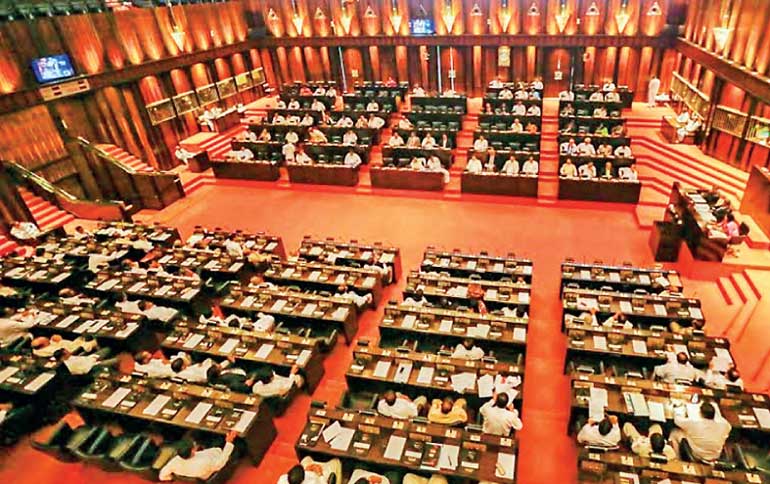Monday Feb 16, 2026
Monday Feb 16, 2026
Saturday, 24 March 2018 00:56 - - {{hitsCtrl.values.hits}}

By Ashwin Hemmathagama and Skandha Gunasekara
Despite chaos reigning in Parliament once again, the much awaited Active Liability Management Bill was passed by the House yesterday (23 March) with the Bill receiving a comfortable majority of 51 votes for and only 2 against.
The Joint Opposition staged yet another protest, following a technical glitch in the electronic voting system.
When the Bill was put to a vote around 6 pm, it initially received 53 votes in favour and 33 against. However, when Speaker Karu Jayasuriya announced the results and attempted to move to the Committee Stage for the Third reading vote, Joint Opposition MP Dr. Bandula Gunawardana objected that result of the vote could not be accepted.
“The voting list of MPs on the digital monitor shows that Minister S B Dissanayake had cast a vote when he is not even present in the Chambers. How is this possible?” Dr Gunawardana queried, causing the Joint Opposition to invade the Well of the House in protest.
Thereafter when the voting list was examined, it was found that the e-voting device fixed to the seat of Minister S B Dissanayake, who was absent at the time, had recorded his fingerprint casting a vote; while Minister Mangala Samaraweera’s vote in favour of the Bill had failed to be recorded by the system.
At this point, the Speaker suspended Sittings for 10 minutes to convene a Party Leaders meeting to address the matter. When Sittings resumed around 6.30 pm, the Speaker informed the House that a technical glitch had caused the flaw.
“We will hold the Second Reading vote once more,” the Speaker stated.
Nevertheless, the Joint Opposition group MPs left the Chamber in objection.
The Speaker continued with the Second Reading and Third Reading without the JO MPs, and the Bill was passed in the Committee Stage with a majority of 51 votes.
JVP MPs Nalinda Jayatissa and Bimal Ratnayake were the only MPs to vote against the Bill.
The Active Responsibility Management Act paves the way for the Government to authorise the raising of loans within the country or offshore to improve public debt management. It also ensures that the financial needs and payment obligations of the Government are met at the lowest possible cost over the medium to long-term, consistent with a prudent degree of risk.
However, unlike any other Act, the Active Responsibility Management Act has limited its defence in criminal or civil liabilities to Central Bank employees for anything done or purported to be done in the discharge or intended discharge of obligations under the Act or any regulation, Order, decision or directive issued and made thereunder, if the respective employee proves that the employee acted in good faith and exercised all due diligence, reasonable care and skill.
State Minister of National Policies and Economic Affairs Niroshan Perera assured the House that provisions in the bill giving legal immunity to certain Central Bank officials and the subject Minister in charge of the Central Bank would be done away with before the Bill was put to a vote.
“We will bring in amendments to the provisions giving immunity to the subject Minister and Central Bank officials and have them removed as well as ensuring that the Bill is brought under established monetary laws,” Minister Perera said.
According to the available provisions, Parliament may, from time to time, by resolution, approve to raise a sum of money during a particular financial year which will not exceed 10% of the total outstanding debt as at the end of the preceding financial year, as a loan whether in or outside Sri Lanka, in terms of the relevant laws for moneys to be raised including the provisions of the Monetary Law Act (Chapter 422), the Local Treasury Bills Ordinance (Chapter 417), Registered Stocks and Securities Ordinance (Chapter 420), or the Foreign Loans Act, No. 29 of 1957, for and on behalf of the Government for the purposes of refinancing and pre-financing of public debts of the Government.